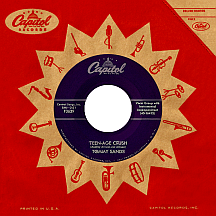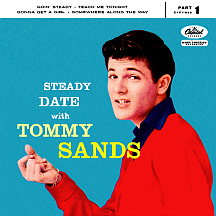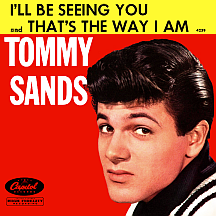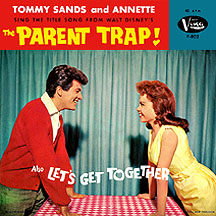TOMMY SANDS
In the early months of 1956, as soon as it became obvious Elvis Presley was the most explosive singer since the recording industry had been launched on cylinders in the 1880s, the search began for "The Next Elvis." Anyone who might fit the bill would need to have Presley's teenage heartthrob looks and a convincing country/rhythm and blues approach to delivering a song. Tommy Sands was a good candidate; he just had to figure out a way to introduce himself to a nationwide audience. He achieved it through a promotional music-and-TV tie-in that had been done a few times before. Tommy became one of 1957's hottest young celebrities, but by the time a few years had passed it seemed the public was more interested in his marriage to the daughter of an entertainer who was, perhaps, the most notorious of all pre-Presley singing stars.
Thomas Adrian Sands had a busier and more eventful childhood than most, spending several years dividing time between his separated parents, dad in Chicago and mom in Shreveport, Louisiana. A country and western fan, he spent several hours a day glued to the radio; his mother, former singer Grace Lou Dixon, bought him a guitar when he was seven. He taught himself to play and within a year landed a twice-weekly afternoon stint performing on Shreveport radio station KWKH. By the early 1950s he and mom had moved to Houston where, at 14, he made his first record, a hillbilly number called "Love Pains," credited to Little Tommie Sands (The West's Wonder Boy) and released on Freedom, a local label that usually focused on R&B. Colonel Tom Parker (he was Eddy Arnold's manager at one point) took notice and signed the highschooler to a management deal with his company, Jamboree Attractions. Several singles were released on RCA Victor (starting with a reissue of "Love Pains"), but within two years he was dropped by the label and Parker, who had begun managing Presley. By that time Tommy had been featured, along with Elvis, on KWKH's extremely popular Louisiana Hayride show.
His big break came at the start of 1957, several months after moving to Los Angeles. He made the trek to New York to audition for the lead in The Singin' Idol, a television drama about a rock and roll star similar to Presley. He got the part (playing a fictional character, Ewell Walker, torn between religion and rock), which aired live on NBC's Kraft Television Theatre January 30, 1957; prior to the show, he worked with vocal coaches on excising his country twang. He sang "Teen-Age Crush" and "Hep Dee Hootie (Cutie Wootie)" on the show, both recorded and made ready for release on his new label, Capitol, to take advantage of the nationwide exposure (this ploy had been used a couple of years earlier; "Let Me Go Lover" by Joan Weber hit number one after it was featured on a November '54 installment of the CBS series Westinghouse Studio One). The announcer at the end of the Kraft broadcast mentioned the record "...will be available in your local record dealers tomorrow"...so it came as no surprise when those dealers quickly put in reorders for Sands' sold-out single.
"Teen-Age Crush" debuted high on the charts the following week and peaked at number two in March; Tab Hunter, another singing idol who'd already been making movies for a few years, had a lock on the number one spot with "Young Love." Tab or no Tab, the more Elvislike Tommy was an instant sensation. He was so big in those early months of '57 that he secured a spot on the year's highest-rated TV program, the 29th annual Academy Awards, broadcast March 28, performing "Friendly Persuasion (Thee I Love)" in place of Pat Boone, who'd had the hit version. Exactly two weeks later, Sands was the surprise guest on NBC's This is Your Life, his limited time as a show-biz star apparently of less concern to host Ralph Edwards than a little well-timed ratings-grabbing.
Record sales cooled off with the second single, uptempo teener "Ring-A-Ding-A-Ding" and flip side ballad "My Love Song." On May 8, Tommy starred with Victor Jory in Kraft Television Theatre's tenth anniversary episode, Flesh and Blood, a mob drama. In June, his next single, "Goin' Steady" (a pop-rock remake of Faron Young's 1953 country hit), reached the top 20; he'd performed the flip, "Ring My Phone," on the Kraft teleplay. "Let Me Be Loved," a Jay Livingston-Ray Evans song from the documentary film The James Dean Story, missed the charts altogether. Tommy's own composition, "Man, Like Wow!," suggests he may have been paying considerable attention to the attitude projected by labelmate Gene Vincent. Soon he would be following Gene's lead, offering up a tougher brand of rock and roll...but first he had acting obligations (such as his "horse opera" debut on a November episode of Zane Grey Theater), among them his first starring role in a feature film.
Sing Boy Sing was essentially Kraft's Singin' Idol expanded to a major musical picture. The hit title track was written by Tommy and Rod McKuen and the film featured a mix of older and more contemporary selections. As he balanced singing with acting (mostly in television), any public perception as an Elvis imitator faded (though he admitted to patterning himself...just a little, mind you!...after his old Hayride pal). He kept busy doing episodes of Shower of Stars and Studio One in Hollywood and made his second consecutive appearance on the Oscar telecast of March 26, 1958, again singing a song made famous by Pat Boone, "April Love," this one from a movie Pat starred in. It was an ensemble effort, performed on the show by the film's costar Shirley Jones, in addition to Ann Blyth, Anna Maria Alberghetti and Jimmie Rodgers, plus Tommy and the guy who'd kept him from hitting number one, Tab Hunter!
Around this time, Sands began to scratch his itch for something more primitively rhythmic. Sure, the hits that established him were rock of a teen-appeal sort, many featuring talented studio musicians like pianist Merrill Moore and guitarists Bob Bain and future country star Buck Owens. But then he started working with a group called The Raiders and his music hit a turning point. Guitarist Scotty Turner (originally from Sydney, Nova Scotia) led the Texas-based band with bassist Leon Bagwell and rhythm guitarist Eddie Edwards; L.A. studio drummer Hal Blaine joined later. Scotty had previously recorded at Norman Petty's Clovis, New Mexico studio, during which time he and Buddy Holly wrote songs together. "Blue Ribbon Baby," an energetic rocker penned by Bronx-born Diane Lampert and Scotty (using an alias, Allison Dewar), was released by Tommy Sands and the Raiders and climbed halfway up Billboard's Hot 100. Working together was great for the group, in need of a steady gig, and improved Tommy's credibility as a rock and roller. Some of his best (but, unfortunately, not best-selling) work was still to come.
In November, he had a supporting role in Mardi Gras starring Pat Boone (Tommy's second appearance on the big screen, Pat's third); the New Orleans setting was trendy in '58, what with Fats Domino, Lloyd Price, Huey (Piano) Smith and other Big Easy acts burning up the charts (plus King Creole, with Elvis wandering the French Quarter, had been a big summer movie). In early '59, Sands and the Raiders rocked, stand-up-bass-style, on Lampert and Turner's "The Worryin' Kind," a career peak according to many fans (it was Tommy's favorite, the only song he ever completed in just one take). Around this time the Raiders started calling themselves The Sharks after some performance dates in Hawaii, though the name didn't appear on any record labels. Then Tommy did an about-face, recording the Sammy Fain-Irving Kahal chestnut "I'll Be Seeing You" (Bing Crosby had taken it to number one in '44) with a lush string arrangement by Nelson Riddle; it was a minor hit in the fall of 1959.
Getting booked into top-draw nightclubs like the Waldorf Astoria in N.Y. and the Cocoanut Grove in L.A. gave Tommy a chance to perform pop standards in place of the hits that had made him famous. Then the inevitable happened: in late 1959, he performed in the Copa Room at the Sands Hotel in Las Vegas...and Capitol just couldn't resist releasing a live performance from the engagement as an album titled Sands at the Sands. The Raiders split up at this point; Scotty Turner played on a few of Gene Vincent's records, then produced a variety of pop artists, starting with Guy Mitchell, and made his mark as a songwriter with Jerry Wallace's 1963 hit "Shutters and Boards." Hal Blaine moved into session work on a more or less full-time basis, becoming a regular fixture on hit singles produced in Los Angeles over the next couple of decades.
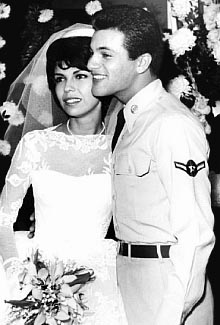
Tommy met Nancy Sinatra several years before her own "Boots"-infused breakthrough as a singer and within a few months the two were engaged. He joined the Air Force Reserves, leaving for continuous assignment from May through November '60 (returning home for standard duty totaling six years). In August he hit the charts with "The Old Oaken Bucket" (an adaptation by Ervin Drake of a 19th-century poem), his last single to rack up any sales or significant airplay. In September, on a short break from duty, he and Nancy were married. While successive Capitol releases faltered, Tommy indulged in some film projects; he and Annette Funicello duetted on the title theme from Walt Disney's The Parent Trap (starring Hayley Mills as twins, it was one of the top-grossing films of 1961). He dyed his hair blonde for a disappointing comedy-and-music outing, Love in a Goldfish Bowl, co-starring with Fabian. The Disney theme led to an onscreen star vehicle with Annette in the Mother Goose-inspired Babes in Toyland.
He landed a small part in the 1962 blockbuster The Longest Day (the ambitious three-hour movie had five directors!); singin' idols Fabian, Paul Anka and Sal Mineo also had roles in the Cinemascope Oscar winner. A regular on TV, he had parts in episodes of The United States Steel Hour, Alcoa Premiere, Kraft Suspense Theatre, westerns Wagon Train, Laramie, Branded and Bonanza, drama series Slattery's People and Mr. Novak and another battle-zone turn on Combat! After leaving Capitol, he signed with ABC-Paramount and worked with producer Don Costa in '63 and '64; these efforts walked the line between teen and adult pop. In '65 he tried a slightly more rock-leaning thing with Snuff Garrett and Leon Russell at Liberty Records.
Movie roles centered on the miltary: a comedy, Ensign Pulver, was followed by a minor part in None But the Brave, a war drama starring Frank Sinatra. Tommy and wife Nancy appeared happy as "Mystery Guests" on a February '65 episode of What's My Line?, but they were divorced that summer (his disinterest in having children was cited by Nancy as a major reason). Media gossip mongers spread the theory that former father-in-law Frank made "arrangements" for the kid's career to hit the skids. After one final film (The Violent Ones in '67), a small-label farewell single (the Jacques Brel-McKuen folk song "Seasons in the the Sun" in '69) and a move to Hawaii, could it be there was a smidgen of truth to the rumor? Tommy Sands has insisted he had a fondness for the Aloha State and made a conscious decision to "drop out" of show-biz (though not completely; he appeared a few times over the years on CBS's venerable Hawaii Five-O). His eight films, numerous small screen appearances and music (particularly the late-'50s recordings with the Raiders) proves his talent was a cut above that of your typical teen idol.
NOTABLE SINGLES:
- Love Pains - 1953
as Little Tommie Sands - Life is So Lonesome - 1954
- Don't Drop It - 1954
- Teen-Age Crush /
Hep Dee Hootie (Cutie Wootie) - 1957 - Ring-A-Ding-A-Ding /
My Love Song - 1957 - Goin' Steady /
Ring My Phone - 1957 - Let Me Be Loved - 1957
- Man, Like Wow! - 1957
- Sing Boy Sing - 1958
- Teen-Age Doll - 1958
- After the Senior Prom - 1958
- Blue Ribbon Baby - 1958
by Tommy Sands and the Raiders - The Worryin' Kind - 1959
- I'll Be Seeing You - 1959
- The Old Oaken Bucket - 1960
- The Parent Trap - 1961
by Tommy Sands and Annette - Love in a Goldfish Bowl - 1961
- Only Cause I'm Lonely - 1963
- Love's Funny - 1965
- The Statue - 1965
- Candy Store Prophet - 1967
- Seasons in the Sun - 1969


